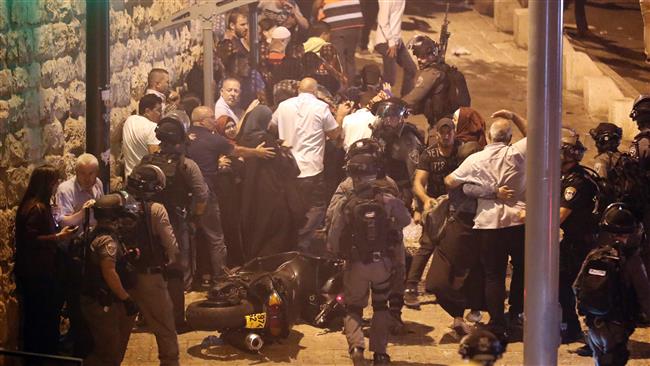
RNA - “Jerusalem al-Quds is a red line,” the regional organization’s chief, Ahmed Abul Gheit, said in a statement released on Sunday, adding that “no Arab or Muslim will accept violations” against holy sites in the city.
Abul Gheit further accused Israel of “adventurism” and said its imposition of fresh restrictive measures could trigger a “crisis with the Arab and Muslim world.”
The statement came after two Palestinian teenagers succumbed to injuries they sustained during clashes in protest at Israel’s imposition of restrictive measures at the al-Aqsa Mosque compound, including the installment of metal detectors and cameras, following a deadly shooting attack more than a week ago.
The Palestinian Health Ministry said 17-year-old Oday Nawajaa died on Saturday after being hit by Israeli live fire in the West Bank city of al-Eizariya.
Another 18-year-old Palestinian suffered fatal injuries in the West Bank town of Abu Dis, when a petrol bomb exploded prematurely.
On July 14, three Palestinians opened fire on Israeli forces at the al-Aqsa Mosque compound, killing two of them before being shot dead.
Israel detains Hamas lawmaker in West Bank
Separately, Israeli forces arrested a legislator with the Gaza-based Islamic resistance movement, Hamas, along with nearly a dozen other Palestinians during separate operations across the occupied West Bank.
A large number of Israeli troopers raided the home of 53-year-old Omar Abdel Razek in the central West Bank city of Salfi on Sunday morning, and violently ransacked it before taking the Palestinian lawmaker away to an unknown location.
Israeli forces have detained Abdel Razek on multiple occasions in the past. The Palestinian lawmaker was last arrested in mid-2014 after the killing of the three settlers in al-Khalil (Hebron).
He has been held each time under Israel's policy of administrative detention, which is a sort of imprisonment without trial or charge that allows Israel to incarcerate Palestinians for up to six months. The jail term can be extended for an infinite number of times.
Some prisoners have been held in administrative detention for up to 11 years without any charges brought against them.
Palestinian detainees have continuously resorted to open-ended hunger strikes to express their outrage at the detentions.
Also early on Tuesday, Israeli forces broke into several homes across West Bank and the Old City of Jerusalem al-Quds, arresting more than two dozen Palestinians.
Two minor girls aged 16 and 17 from the predominantly Palestinian neighborhood of Silwan on the outskirts of the Old City of Jerusalem al-Quds, and an activist from Ramallah were among those arrested.
Israel may reduce metal detectors installed at al-Aqsa Mosque
Meanwhile, Israeli officials said on Sunday that they will not remove metal detectors installed outside al-Aqsa Mosque compound.
“They (metal detectors) will remain…. If they (Palestinians) do not want to enter the mosque, then let them not enter the mosque,” Tzachi Hanegbi, Israeli minister for regional development and a senior member of the ruling Likud party, told Israel's Army Radio.
However, Gilad Erdan, Israel's public security minister, also told Army Radio that Israeli officials may do away with metal detector checks for all Muslims entering the al-Aqsa Mosque.
“There are, after all, many worshipers whom the police knows, regulars, and very elderly people and so on, and it is recommended that we avoid putting all of these through metal detectors,” Erdan commented.
This is while the Muslim authorities in charge of al-Aqsa Mosque affairs said they would continue to refuse to go through the metal detectors, and will hold street prayers.
“We stress our absolute rejection of the electronic gates, and of all measures by the Occupation (Israel) that would change the historical and religious status in Jerusalem al-Quds and its sacred sites, foremost the blessed Aqsa Mosque,” Grand Mufti of Jerusalem al-Quds Muhammad Hussein, Chief Justice Chancellor Emad Saleem Sa’ad and the Jordanian-sponsored Waqf religious trust said in a joint statement.
The occupied Palestinian territories have witnessed new tensions ever since Israeli forces introduced restrictions on the entry of Palestinian worshipers into the al-Aqsa Mosque compound in East Jerusalem al-Quds in August 2015.
More than 300 Palestinians have lost their lives at the hands of Israeli forces in the ongoing tensions since the beginning of October 2015.
The Tel Aviv regime has tried to change the demographic makeup of Jerusalem al-Quds over the past decades by constructing settlements, destroying historical sites and expelling the local Palestinian population. Palestinians say the Israeli measures are aimed at paving the way for the Judaization of the city.
The al-Aqsa Mosque compound is a flashpoint Islamic site, which is also holy to Jews. The mosque is Islam’s third holiest site after Mecca and Medina in Saudi Arabia.
847/940